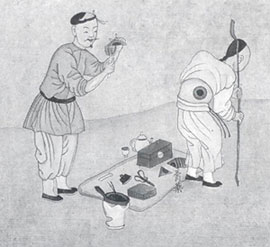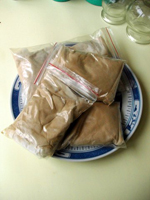
TCM has a wide range of topical remedies, which still remain popular folk remedies in remote villages of China. People like to pick fresh seasonal herbal or animal ingredients and make them into different products such as lotions, cream, tinctures, pastes, powders or suppositories; they then apply these on lesions directly or insert into body cavities for healing purposes.
For cancer patients who are in middle and late stages of their disease, there are usually problematic symptoms like pain, fever, fluid retention and lymph gland enlargement. And because of the general weakness of patients during the stages, internal TCM treatment methods alone are not satisfactory . Therefore, topical applications play an important role in TCM cancer treatments. Through the absorption of skin or membranes, individuals can attain a faster and more direct result than with merely oral administration of medicine. This also enables drugs to bypass the interference from the kidney and liver as well as avoid adverse stimulation on the intestinal tract.

External herbal remedies
According to the
organs or
meridians involved, TCM specialists formulate an appropriate prescription. The ingredients are powdered or decocted and then mixed with a base to produce a desirable form. Physicians adopt different bases to help to exert a particular effect. For example, alcohol extracts the constituents well and enhances drug potencies; vinegar promotes the removal of stasis and detoxification; the juices of ginger, green onion and garlic aid in expelling
evils with their pungent properties; chrysanthemum , honeysuckle and loofah leaves have cooling properties and their juices can act as an antidote for toxic heat; pig bile juice can clear
heat and purge fire, honey and egg white are lubricating and adhesive, and thus make the medicinal materials available to the skin for extended periods of time.
Generally, local applications are beneficial for symptoms like swelling, nausea, pain, coughing, constipation, urinary difficulty or persistent ulcers. TCM cancer specialists usually apply topical remedies in the following aspects:

Herbal packs for washing
In addition, for gastro-intestinal cancers with associated symptoms like pain, constipation, diarrhea and poor appetite, herbal enemas may be considered. In some cases, physicians also use decoctions or tinctures for washing or steaming; for example, metastatic bone pain, intestinal adhesion or body pain.
It should be noted that TCM topical applications should only be applied under professional guidance, because most ingredients are strong or toxic substances. Individuals with a predisposition to allergies or allergic reaction are not suitable for this treatment as the materials are irritating. Depending on individual tolerance, dressings are usually changed every 24 hours, and one course may last for 20 to 30 days in order to achieve better effects. Risks of the above remedies may include skin ulcers, tumor rupture, bleeding and general poisoned.
 TCM has a wide range of topical remedies, which still remain popular folk remedies in remote villages of China. People like to pick fresh seasonal herbal or animal ingredients and make them into different products such as lotions, cream, tinctures, pastes, powders or suppositories; they then apply these on lesions directly or insert into body cavities for healing purposes.
For cancer patients who are in middle and late stages of their disease, there are usually problematic symptoms like pain, fever, fluid retention and lymph gland enlargement. And because of the general weakness of patients during the stages, internal TCM treatment methods alone are not satisfactory . Therefore, topical applications play an important role in TCM cancer treatments. Through the absorption of skin or membranes, individuals can attain a faster and more direct result than with merely oral administration of medicine. This also enables drugs to bypass the interference from the kidney and liver as well as avoid adverse stimulation on the intestinal tract.
TCM has a wide range of topical remedies, which still remain popular folk remedies in remote villages of China. People like to pick fresh seasonal herbal or animal ingredients and make them into different products such as lotions, cream, tinctures, pastes, powders or suppositories; they then apply these on lesions directly or insert into body cavities for healing purposes.
For cancer patients who are in middle and late stages of their disease, there are usually problematic symptoms like pain, fever, fluid retention and lymph gland enlargement. And because of the general weakness of patients during the stages, internal TCM treatment methods alone are not satisfactory . Therefore, topical applications play an important role in TCM cancer treatments. Through the absorption of skin or membranes, individuals can attain a faster and more direct result than with merely oral administration of medicine. This also enables drugs to bypass the interference from the kidney and liver as well as avoid adverse stimulation on the intestinal tract.
 External herbal remedies
According to the organs or meridians involved, TCM specialists formulate an appropriate prescription. The ingredients are powdered or decocted and then mixed with a base to produce a desirable form. Physicians adopt different bases to help to exert a particular effect. For example, alcohol extracts the constituents well and enhances drug potencies; vinegar promotes the removal of stasis and detoxification; the juices of ginger, green onion and garlic aid in expelling evils with their pungent properties; chrysanthemum , honeysuckle and loofah leaves have cooling properties and their juices can act as an antidote for toxic heat; pig bile juice can clear heat and purge fire, honey and egg white are lubricating and adhesive, and thus make the medicinal materials available to the skin for extended periods of time.
Generally, local applications are beneficial for symptoms like swelling, nausea, pain, coughing, constipation, urinary difficulty or persistent ulcers. TCM cancer specialists usually apply topical remedies in the following aspects:
External herbal remedies
According to the organs or meridians involved, TCM specialists formulate an appropriate prescription. The ingredients are powdered or decocted and then mixed with a base to produce a desirable form. Physicians adopt different bases to help to exert a particular effect. For example, alcohol extracts the constituents well and enhances drug potencies; vinegar promotes the removal of stasis and detoxification; the juices of ginger, green onion and garlic aid in expelling evils with their pungent properties; chrysanthemum , honeysuckle and loofah leaves have cooling properties and their juices can act as an antidote for toxic heat; pig bile juice can clear heat and purge fire, honey and egg white are lubricating and adhesive, and thus make the medicinal materials available to the skin for extended periods of time.
Generally, local applications are beneficial for symptoms like swelling, nausea, pain, coughing, constipation, urinary difficulty or persistent ulcers. TCM cancer specialists usually apply topical remedies in the following aspects:
 Herbal packs for washing
In addition, for gastro-intestinal cancers with associated symptoms like pain, constipation, diarrhea and poor appetite, herbal enemas may be considered. In some cases, physicians also use decoctions or tinctures for washing or steaming; for example, metastatic bone pain, intestinal adhesion or body pain.
It should be noted that TCM topical applications should only be applied under professional guidance, because most ingredients are strong or toxic substances. Individuals with a predisposition to allergies or allergic reaction are not suitable for this treatment as the materials are irritating. Depending on individual tolerance, dressings are usually changed every 24 hours, and one course may last for 20 to 30 days in order to achieve better effects. Risks of the above remedies may include skin ulcers, tumor rupture, bleeding and general poisoned.
Herbal packs for washing
In addition, for gastro-intestinal cancers with associated symptoms like pain, constipation, diarrhea and poor appetite, herbal enemas may be considered. In some cases, physicians also use decoctions or tinctures for washing or steaming; for example, metastatic bone pain, intestinal adhesion or body pain.
It should be noted that TCM topical applications should only be applied under professional guidance, because most ingredients are strong or toxic substances. Individuals with a predisposition to allergies or allergic reaction are not suitable for this treatment as the materials are irritating. Depending on individual tolerance, dressings are usually changed every 24 hours, and one course may last for 20 to 30 days in order to achieve better effects. Risks of the above remedies may include skin ulcers, tumor rupture, bleeding and general poisoned.


